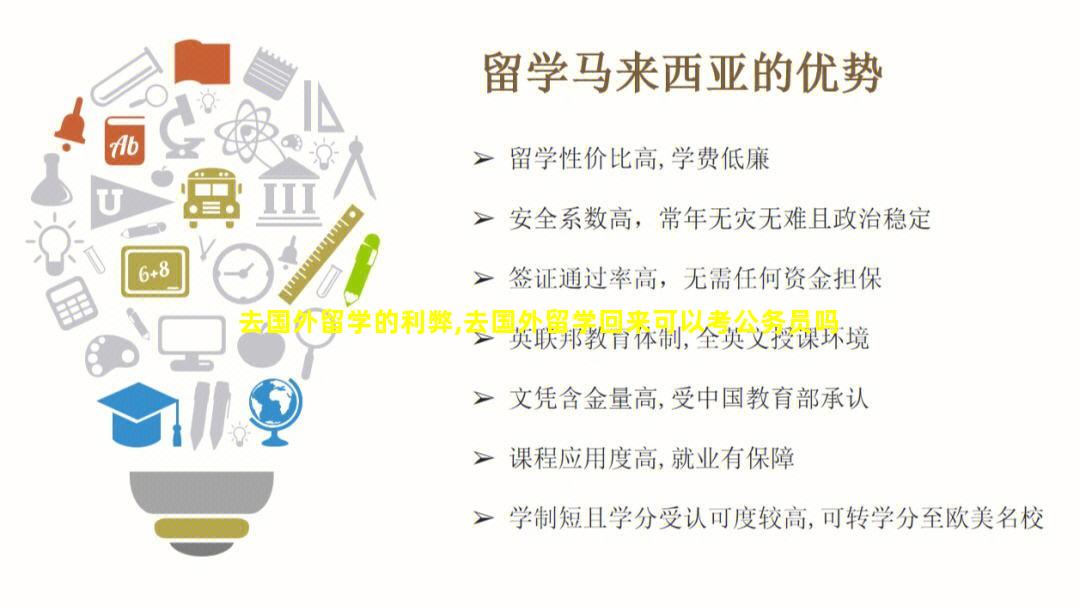 策留网
策留网是的,在国外留学回来后可以考公务员。
根据《公务员法》等相关规定,公务员考试不限制留学经历。因此,符合公务员考试报考条件的留学回国人员,可以报考公务员考试。
需要注意的是:
报考条件:留学回国人员需要满足公务员考试的一般报考条件,如中国国籍、国内全日制大学本科以上学历、年龄限制等。
学历认证:留学回国人员需要对国外学历进行认证,获得教育部留学服务中心的认证材料。
政策限制:一些公务员岗位可能会对留学经历有特殊要求或限制,如某些涉密岗位或要求国内教育背景的岗位。因此,建议在报考前仔细查看岗位要求。
Advantages and Disadvantages of Studying Abroad
Studying abroad has become an increasingly popular option for students seeking a global education and broadening their horizons. However, before embarking on this journey, it is crucial to weigh the potential advantages and disadvantages to make an informed decision.
Advantages:
Enhanced career prospects: International experience is highly valued by employers in today's globalized economy. Studying abroad demonstrates adaptability, cultural awareness, and problemsolving skills, which are essential for success in diverse work environments.
Personal growth and development: Immersing oneself in a foreign culture challenges students to step outside of their comfort zones, embrace new perspectives, and develop independence and selfreliance.
Expanded global network: Studying abroad fosters connections with individuals from different countries, creating a valuable global network of friends, mentors, and potential collaborators.
Improved language proficiency: The best way to learn a foreign language is by living and studying in the country where it is spoken. This immersive experience significantly enhances language skills and provides an authentic understanding of the culture.
Academic diversity: International universities offer a diverse range of courses and programs not available in domestic institutions. This exposure to different academic perspectives and teaching methods broadens intellectual horizons and prepares students for a multicultural world.
Disadvantages:
Cost: Studying abroad can be significantly more expensive than studying domestically. This includes tuition fees, living expenses, and travel costs.
Culture shock: Adjusting to a foreign culture can be challenging, leading to feelings of disorientation, homesickness, and culture shock. It is important to be prepared for these challenges and seek support when necessary.
Academic differences: Educational systems vary around the world, and students may need to adjust to different teaching methods, grading criteria, and language of instruction.
Difficulty in finding accommodation: In popular study abroad destinations, finding affordable and suitable accommodation can be a challenge, especially during peak seasons.
Visa restrictions: Depending on the country of destination, students may face visa restrictions that limit their stay or ability to work. It is essential to research visa requirements and apply for them well in advance.
Ultimately, the decision of whether or not to study abroad depends on individual circumstances, goals, and financial resources. By carefully considering the advantages and disadvantages outlined above, students can make an informed choice that aligns with their aspirations.
Pros and Cons of Studying Abroad
The decision of whether or not to study abroad is a significant one, and it's important to weigh the potential benefits and drawbacks before making a choice. Here are some of the pros and cons to consider:
Pros:
Broaden your horizons: Studying abroad exposes you to different cultures, perspectives, and ways of life, widening your worldview and making you more openminded.
Enhance your career prospects: An international degree can make you more competitive in the global job market and give you a unique edge in your field.
Learn a new language: Immerse yourself in a foreign language by living and studying abroad, improving your proficiency and gaining a valuable skill.
Personal growth: Leaving your comfort zone and navigating a new environment can foster independence, resilience, and maturity.
Build a global network: Studying abroad allows you to connect with students and professionals from around the world, expanding your personal and professional networks.
Cons:

High cost: Studying abroad can be expensive, including tuition, living expenses, and travel costs. Scholarships and financial aid may be available to reduce the burden.
Homesickness and culture shock: Being away from home and adjusting to a new culture can be challenging, leading to homesickness and culture shock. It's important to have support systems and resources in place.
Academic challenges: The education system and curriculum in your host country may differ from what you're accustomed to, potentially creating academic challenges.
Social isolation: It can be difficult to form meaningful connections with locals or other international students, especially if you have language barriers or cultural differences.
Missed experiences: Studying abroad may mean missing out on important events or milestones back home, such as graduations or family gatherings.
Conclusion:
The decision of whether or not to study abroad is a personal one that depends on your individual circumstances and goals. Weighing the potential benefits and drawbacks carefully will help you make an informed choice that aligns with your aspirations. If you're open to expanding your horizons, embracing challenges, and gaining invaluable experiences, studying abroad may be an enriching and transformative endeavor.